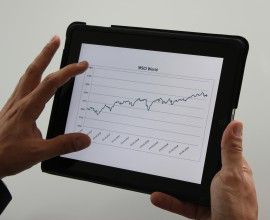
The Homo INNOVATICUS
The world of investments is a world of money. Everyday people out there make money with their investments….or they lose it. Money makes the world go round and most people are working really hard for earning their money. That is the reason, why money or investing respectively is an emotional highly charged topic. If you have some experience in investing your own money you know for sure how painful it is, if one of your investments loses money. In comparison the pain is even higher, than the pleasure if you win the same percentage with another investment – academic studies show, that the pain is actually twice as high as the pleasure from an equal gain.
“Investing is not a game where the guy with the 160 IQ beats the guy with
the 130 IQ…Once you have ordinary intelligence, what you need is the
temperament to control the urges that get other people into trouble in
investing.” — Warren Buffett
Most of the time emotionally based decisions are bad decisions – not only in investing. Cause our emotions make us blind for the facts and the logical conclusions out of the situation. Over the last few decades a new science has established in finance, which deals exactly with the irrational and emotionally affected decision of investors. It is called „Behavioral Finance“.
Basically every investor has already read articles or books about Behavioral Finance. And everyone will nod his head about the things and the emotional traps Behavioral Finance researches. It is simply a fact, that the „Homo Oeconomicus“ does not exist at all….he is only a theoretical creature important to explain theoretical connections in a very simple way, so that we all get a good clue how things could work….in real life we know, that things are much more complex and no theoretical model will ever be able to explain certain investment related things and outcomes in detail.
Even if Behavioral Finance is a science it is not a dry subject, the opposite it true. It is a way you can deal with yourself …. and your emotional, investment related mistakes. Some findings will make you laugh about yourself and some other ones will make you wonder „How do they know?“. The task of Behavioral Finance is not to show you all of your mistakes, but to give you some food for your own thoughts and how you could be a bit more of an „Homo Oeconomicus“. Cause if your decisions will become more rational, your performance in the long run will be better too. Big Value Investors like Warren Buffet, Howard Marks, Bruce Greenwald, etc. prove to be good examples. They never thought about Behavioral Finance directly and they all started long before this science saw the light of the day. Nevertheless they all act very rational in their investment decisions and always amaze the crowd of investors with totally different and very logical views regarding the things happening on the markets.
So what we learn out of it is that even if „Homo Oeconomicus“ does not exist at all, we should strive to behave a little bit more like one.
At INNOVATIS we don’t claim to be the smartest people out there….we don’t need to be the guys with the 160 IQ or higher. We simply try to structure products, which make sense from a rational standpoint and manage the portfolios in a way, so that they yield a stable and sustainable performance in the long run. We don’t say, that we know what the market will do in the next few weeks and months, but we are convinced, that we can offer you the best products and services for the markets development within the next few years.
Archives
- June 2019 (1)
- March 2019 (1)
- February 2019 (1)
- December 2018 (1)
- May 2018 (1)
- January 2018 (1)
- December 2017 (2)
- October 2017 (1)
- September 2017 (1)
- August 2017 (1)
- July 2017 (1)
- June 2017 (2)
- May 2017 (2)
- April 2017 (2)
- March 2017 (3)
- February 2017 (2)
- January 2017 (2)
- December 2016 (4)
- November 2016 (3)
- October 2016 (3)
- September 2016 (2)
- August 2016 (5)
- July 2016 (2)
- June 2016 (4)
- May 2016 (1)
- April 2016 (4)
- March 2016 (5)
- February 2016 (3)
- January 2016 (3)
- December 2015 (5)
- November 2015 (5)
- October 2015 (4)
- September 2015 (3)
- August 2015 (7)
- July 2015 (7)
- June 2015 (5)
- May 2015 (6)
- April 2015 (9)
- March 2015 (9)
- February 2015 (9)
- January 2015 (9)
- December 2014 (11)
- November 2014 (10)
- October 2014 (3)
- September 2014 (1)
- August 2014 (2)
- July 2014 (2)
 Investor Login
Investor Login

